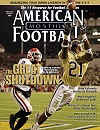AMERICAN FOOTBALL MONTHLY THE #1 RESOURCE FOR FOOTBALL COACHES
Article CategoriesAFM Magazine
|
Blocking, Tackling and Leadershipby: Ted RoofDuke University © More from this issue On behalf of our football program it is indeed a privilege for me to submit this article. As coaches we devote quite a bit of time and effort teaching the fundamental principles and techniques of blocking and tackling. We do this because we know what a tremendous impact these fundamentals have on our game. Another fundamental that I believe to be critical to an organization’s success is leadership. Leadership is becoming increasingly more critical in college athletics as our level of control diminishes due to NCAA rules and restrictions and our level of accountability increases. We as coaches are being held accountable not only for the performance of our teams on the field but also for our student-athletes’ actions in many other areas outside of athletic performance. The process of developin....The full article can only be seen by subscribers. Subscribe today!
|
|
|||||||
| HOME |
MAGAZINE |
SUBSCRIBE | ONLINE COLUMNISTS | COACHING VIDEOS |
Copyright 2026, AmericanFootballMonthly.com
All Rights Reserved





